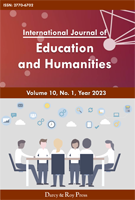Effects of Martial Arts Participation among College Students Psychological Stress
DOI:
https://doi.org/10.54097/etcq9z44Keywords:
Martial Arts Participation; Psychological Stress; College Students.Abstract
In modern society, college students are facing more and more psychological pressure, which has a negative impact on their physical and mental health. However, martial arts, as an ancient and comprehensive form of physical activity, has been shown to have positive effects on mental health. Therefore, it is of great practical value to study the influence of wushu participation on the psychological stress of college students. In this study, 388 students were randomly selected and the collected data were analyzed by descriptive correlation design and SPSS (Statistical Package for Social Sciences) software. Overall, participants experienced some level of stress in all three areas, with slightly higher stress in their academic life, lower stress in their social life, and moderate stress in their family life. This highlights the importance of providing comprehensive support, including resources and assistance in academic, social and family matters, to promote the overall well-being and mental health of students. Through the study of the influence of Wushu participation on the psychological pressure of college students, it is found that improving physical fitness, releasing pressure, cultivating concentration and self-discipline ability, and providing social support are of great significance to alleviate the psychological pressure of college students.
Downloads
References
Abid, F., Ahmed, S., Noushad, S., Farhat, S., & Fatima, S. S. (2023). Relationship Between Genetic Variant Of OXTR (Rs53576) And MTNR1B (Rs1387153) And Symptoms Of Psychological Stress In Females With Gestational Diabetes Mellitus. JPMA. The Journal of the Pakistan Medical Association, 2209-2213.
Ai, Y., Hummel, T., Nie, H., Yang, J., & Han, P. (2023). Reduced neural responses to pleasant odor stimuli after acute psychological stress is associated with cortisol reactivity. NeuroImage, 120474-120474.
Bardach, L., Huang, Y., Richter, E., Klassen, R. M., Kleickmann, T., & Richter, D. (2023). Revisiting effects of teacher characteristics on physiological and psychological stress: a virtual reality study. Scientific Reports, 1.
Beevor, H. J., Ginty, A. T., Veldhuijzen van Zanten, J. J. C. S., & Williams, S. E. (2023). Mastery imagery ability moderates the relationship between heart rate reactivity to acute psychological stress and perceptions of stress and physiological arousal. Psychophysiology, e14486-e14486.
Cai, Zang & Ding, Liping. (2007). Classification of Chinese martial arts. Journal of Shanghai Institute of Physical Education (05), 65-68. doi:10.16099/j.cnki.jsus.2007.05.015.
Caldonazo, T., Kirov, H., Schneider, U., Beckmann, A. W. K., Weber, G., ... & Doenst, T. (2023). Impact of a 36-hour Nonstop Training Course on Academic, Physical, and Mental Skills as well as Psychological Stress Perception in Cardiac Surgery Residents. The Thoracic and Cardiovascular Surgeon.
Chaudhuri, S., Jõgi, A. L., Pakarinen, E., & Lerkkanen, M. K. (2023). Teaching practices mediating the effect of teachers’ psychological stress, and not physiological on their visual focus of attention. Frontiers in Education.
Deuter, C. E., Kaczmarczyk, M., HellmannRegen, J., Kuehl, L. K., Wingenfeld, K., & Otte, C. (2023). The influence of pharmacological mineralocorticoid and glucocorticoid receptor blockade on the cortisol response to psychological stress. Progress in neuro-psychopharmacology & biological psychiatry, 110905-110905.
Dragano Nico & Lunau Thorsten.(2020).Technostress at work and mental health:concepts and research results. Current opinion in psychiatry(4). doi:10.1097/YCO.0000000000000613.
Franks, K. H., Bransby, L., Buckley, R. F., Yassi, N., Chong, T. T. J., Lim, Y. Y., & Pase, M. P. (2023). Associations of self‐reported psychological stress with memory and cerebrospinal fluid biomarkers of Alzheimer’s disease in middle‐aged adults. Alzheimer's & Dementia, S22.
Franklin, T. C., Goodson, M., Gajelli, T., Rutledge, C., Tharayil, J., Pennebaker, S., ... & Singer, A. C. (2023). Non‐invasive Flicker Neurostimulation Boosts Resilience to Psychological Stress. Alzheimer's & Dementia, S11.
Geißler, C., Knoerlein, J., Bohlmann, M. K. K., Brandt, A., Guluzade, D., Gerber, M., ... & Kunze, M. (2023). [Evaluation of Psychological Distress in Obstetric Patients during the Visit Ban in Hospitals in the SARS-CoV-2 Pandemic: A Prospective, Multicentre, Controlled Study]. Zeitschrift fur Geburtshilfe und Neonatologie.
Geng, S., Zhang, X., Zhu, X., Wang, Y., Wang, Y., & Sun, Y. (2023). Psychological factors increase the risk of ovarian cancer. Journal of obstetrics and gynaecology, 1, 2187573-2187573.
Gearhart, C. A., McCarthy, C. J., & Lambert, R. G. (2023). Teachers' psychological stress and wellbeing during a pandemic: Exploring latent profiles. School Psychology (Washington, D.C.).
Guo, Y. C.. (2018). The construction of oral history research paradigm of martial artists. Journal of Wuhan Institute of Physical Education (01), 63-67. doi:10.15930/j.cnki.wtxb.2018.01.010.
Han Z, Wang GZ & Zhang ZH. (2023). Explanation of "forced interpretation" in the study of Chinese martial arts. Journal of Wuhan Institute of Physical Education (08), 54-61. doi:10.15930/j.cnki.wtxb.2023.08.004.
Huldi, F. J., & Cisar, C. J. (2023). Developing an Annual Training Program for the Mixed Martial Arts Athlete. Strength and Conditioning Journal, 6, 745-753.
H. Xue, G. Zheng & H. Yu. (2022). From narrative history to structural history: reflection and turn in the study of the history of Chinese martial arts since modern times. Journal of Shanghai Institute of Physical Education (09), 73-89. doi:10.16099/j.sus.2021.01.28.0002.
Downloads
Published
Issue
Section
License
Copyright (c) 2024 International Journal of Education and Humanities

This work is licensed under a Creative Commons Attribution 4.0 International License.

















